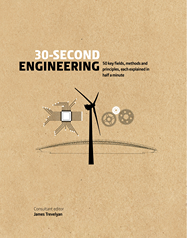30 Second Engineering 50 Key Fields Methods and Principles Each Explained in Half a Minute
Material type: TextLanguage: English Publication details: London : Ivy Press, c2019Description: 159 p. : illISBN:
TextLanguage: English Publication details: London : Ivy Press, c2019Description: 159 p. : illISBN: - 9781782408376
- 620 TRE
| Item type | Current library | Collection | Shelving location | Call number | Copy number | Status | Date due | Barcode |
|---|---|---|---|---|---|---|---|---|
 Lending Collection
Lending Collection
|
Circulation Section | Circulation Section | 620 TRE | 2023-2024 | Available | 98624 | ||
 Reference Collection
Reference Collection
|
Reference Section | Department of Automotive and Marine Engineering | Reference Section | 620 TRE | 2023-24 | Available | 98583 |
SUMMARY
To quickly grasp the nature of engineering the fifty summaries in 30-Second Engineering outlines types of engineering from mechanical to chemical; the universal stages of a collaborative engineering project; and the key ways engineering can solve the challenges of our future earth.
Major buildings, energy supply systems, chemical plants, food processing, and aircraft are all examples of engineering today. Despite such diversity, nearly all engineering fields rely on common principles and methods, and there is remarkable similarity in the daily work of engineers. Engineers spend most effort organising and coordinating collaborative work by all the diverse people involved, guided by their technical knowledge and experience. Unlike physics or biology, where immutable laws underpin the study, the essence of engineering is found in how theory is applied judgementally. To quickly grasp the nature of engineering the fifty summaries in 30-Second Engineering outlines types of engineering from mechanical to chemical; the universal stages of a collaborative engineering project; and the key ways engineering can solve the challenges of our future earth.
